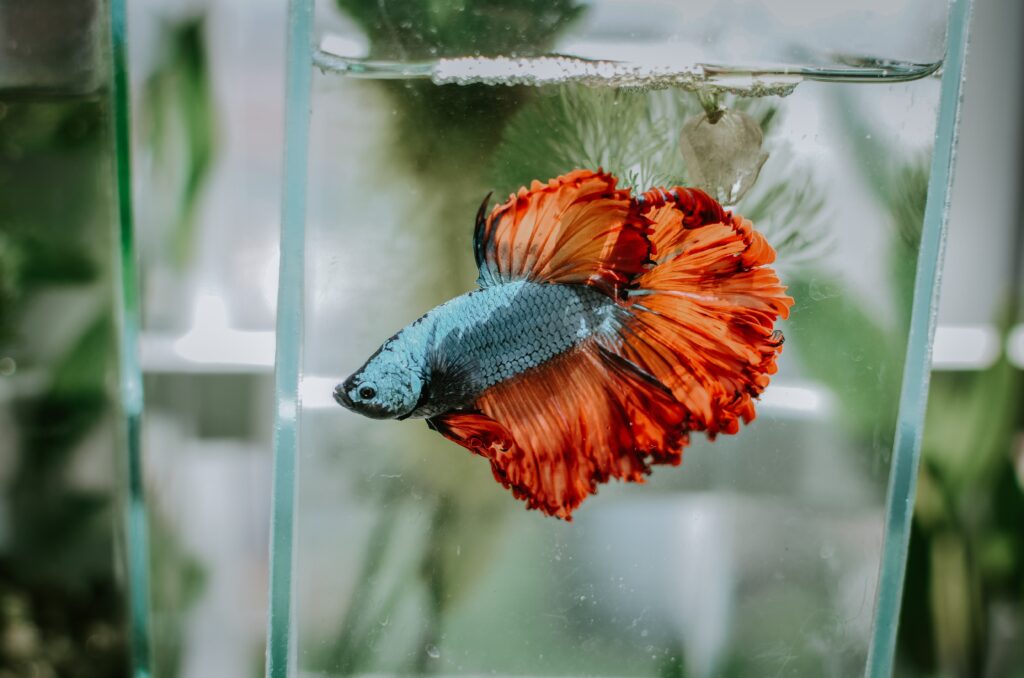Hey there, fellow betta fish enthusiasts! Have you ever found yourself staring at your colorful friend, wondering about their bedtime habits? I sure have. It’s fascinating to think about, especially when you notice them just hanging out, motionless. This brings us to an interesting question: Do Betta Fish Sleep with Their Eyes Open? Let me lay it out straight: Yes, they do. Betta fish don’t have eyelids, so they can’t close their eyes like we do when it’s time to catch some z’s.
Now, I know what you’re thinking. “If their eyes are always open, how can they possibly get any rest?” Stick around, and I’ll dive into the world of betta sleep secrets, where we’ll explore how these vibrant creatures rest with their eyes wide open and why understanding their sleep patterns is crucial to keeping them happy and healthy. Let’s unravel this mystery together, shall we?
Do Betta Fish Sleep With Their Eyes Open?
Yes, betta fish sleep with their eyes open. This fascinating behavior is rooted in their biology and natural survival instincts. Unlike humans and many other animals, betta fish lack eyelids, which means they are physically incapable of closing their eyes.
This might seem peculiar to us, but it’s perfectly normal for betta fish and a crucial adaptation to their aquatic environment.
The absence of eyelids in betta fish is not an oversight by nature but a feature that serves an essential purpose. In the wild, staying alert to potential dangers, even while resting, can be the difference between life and death.
Betta fish, with their eyes perpetually open, can remain somewhat aware of their surroundings during sleep. This allows them to spot predators or other threats quickly and take evasive action, even when in a state of rest.
This unique trait means that betta fish sleep differently than we do. They enter a restful state where their bodies can recover and regenerate, like sleep in other creatures. Still, they do so while maintaining a visual connection with their environment.
During these rest periods, betta fish might seek shelter among plants or decorations in their tank, where they feel safe to let their guard down. Although their eyes remain open, their bodily functions slow down, and they experience reduced activity that constitutes their form of sleep.

How Do Betta Fish Look When They Sleep?
Since they sleep with their eyes open, it can be tricky to tell when your fish is sleeping or just taking it easy. Let’s break it down so you can spot a sleeping betta fish like a pro.
Finding the Perfect Spot: First, betta fish often seek the perfect sleeping spot in their tank. This could be under a leaf, behind a tank decoration, or even nestled in a soft plant. They’re looking for a spot that feels secure and cozy.
The Sleepy Pose: When betta fish sleep, they might not look all that different at first glance because, remember, their eyes will be open. However, you’ll notice they become much less active. They may lie on their side, tuck their fins in a bit, or float in one spot. Some bettas like to wedge themselves into a particular place, like between two leaves, which helps them stay still while they rest.
Slowing Down: Another sign that a betta is sleeping is a noticeable slowdown in its movements. If it does move, it’ll be more sluggish than its usual darting around. This is the fish’s equivalent of turning off its brain and relaxing every muscle.
Color Changes: Some betta fish might even change color slightly while sleeping. Their colors appear a bit faded compared to their bright, alert selves. Don’t worry; this is normal and part of their sleep cycle.
Unresponsive Behavior: If your betta fish is usually quick to react to your presence or the promise of food but isn’t showing much interest, they might be sleeping. Give them some time, and they’ll perk back up when fully awake.
Knowing how your betta fish looks when they sleep is not just a neat party trick; it’s also an important part of ensuring their health and happiness. A betta that has plenty of opportunities to rest and sleep will be more active and vibrant during its waking hours. Plus, watching it find its favorite sleeping spot can be quite endearing!

How To Create A Perfect Sleeping Environment For Betta Fish
Ensuring your betta has a comfy resting place is crucial for their well-being. Like us, betta fish need quality sleep to stay healthy, happy, and vibrant. Here’s how to create the perfect snooze zone for your betta buddy.
Proper Lighting: Betta fish are diurnal creatures that thrive on a natural day-night cycle. To support their sleep-wake rhythm, mimicking this cycle in your aquarium is essential. Consider using a timer for your tank’s light to ensure a consistent cycle of 12 hours of light and 12 hours of darkness. This regularity helps signal to your betta when it’s time to wind down and rest.
Peaceful and Quiet: While betta fish don’t have ears like ours, they can still sense vibrations in the water. Keeping their tank in a low-traffic, quiet area helps minimize disturbances during rest periods. Sudden movements or loud sounds can startle them and interrupt their sleep.
Comfortable Hiding Spots: Bettas love having places to hide and feel secure, especially when they sleep. Adding plants (live or silk, to avoid tearing their fins), caves, or shelter decorations can make your betta feel safe and comfortable. These hiding spots mimic the natural environment betta fish would seek out in the wild for rest.
Appropriate Tank Conditions: Maintaining the proper water temperature and quality is fundamental for your betta’s health and sleep. Betta fish prefer water temperatures between 76°F and 80°F (24°C to 27°C). Too cold or too warm can cause stress and affect their sleep. Regular water changes and monitoring for the correct pH and ammonia levels are crucial to keeping your betta in top shape.
Avoid Overcrowding: Bettas, especially males, are known for their territorial nature. Having too many fish in a tank or housing them with incompatible tank mates can lead to stress and aggression, which definitely impacts their ability to relax and sleep. Ensure your betta has enough space to themselves and consider their personality when introducing tank mates.
Creating a suitable sleeping environment for your betta fish isn’t just about aesthetics; it’s about catering to their natural behaviors and needs. A well-set-up tank with the right conditions can significantly impact your betta’s quality of life, including those all-important restful periods of sleep. Watching your betta peacefully resting in their favorite spot, knowing you’ve provided them with a safe and comfortable home, is one of the many joys of betta fish keeping.
Conclusion
We’ve taken an incredible journey into the sleep world of betta fish, learning that these colorful little swimmers sleep with their eyes wide open and need a cozy spot to catch their z’s just like we do.
Setting up a tank that feels like home for your betta isn’t just about making it look nice; it’s about giving them a spot to sleep safely, wake up energized, and be ready to show off their beautiful colors. Remember, a rested betta is a happy betta.
Keeping your betta’s home clean, calm, and comfy makes all the difference. It turns your tank into a paradise where your fish can thrive. Watching your betta fish peacefully rest or zip around happily is a sign you’re doing things right.
In the end, it’s pretty simple: Take good care of your betta, and your betta will brighten your day. Let’s keep sharing our betta stories and tips, making our finned friends’ lives as vibrant as they make ours. Here’s to the fascinating world of betta fish and the joy they bring into our homes!
